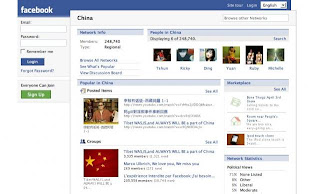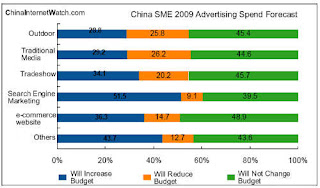Tuesday, October 27, 2009
IntEnablEvision cont...
The combination of the Internet and T.V as IntEnablEvision in China is now feeling the heat as television watchers are literally able to watch pirated media (TV shows, films, etc...) on television in the comfort of their own homes. There have been many lawsuits against the Internet-Enabled T.V manufacturer, Haier such as, "Chinese online video content provider NetMovie.com [that] plans to file a copyright infringement lawsuit against Haier and three other major Chinese vendors selling Internet TVs, Changhong, TCL and Hisense. Online film distributor Union Voole Technology has filed a separate suit against TCL, the company that manufactures these Internet-Enabled T.Vs because of piracy" (Pcworld.com). Because this media is so new, restrictions have yet to be determined and lawfully written, but it will be interesting to see what measures Chinese government takes to govern this unity...till ban do they part
Also, check out a video talking about a new IntEnablEvision-like product Sony has introduced
Monday, October 26, 2009
World Expo... Meet the Internet!
CHINESE INTERNET: Tudou.copyRight or copyWrong? cont...
Thursday, October 22, 2009
CHINESE INTERNET: Saving Face by blocking Facebook

As noted above, two of the most powerful abilities for the Chinese Facebook users are international communication and voiced opinion. Both of these abilities are threatening to a strict and "dictative" Chinese government that acts as a doorkeeper between its citizens and the outside world. When controversial events take place, such as, the riots in the western region of Xinjiang, China and Olympics protest, Chinese government tends to tighten the reigns on social networking sites that they don't control, and that have potential to leak "confidential" Chinese happenings to the "outside" world. This is currently posing a problem for sites like Twitter and Facebook.
A point that I will bring back up, is the difference between international appeal and limited local appeal. Unlike other networking sites that only cater to a predominately one language speaking audience, Facebook has become a somewhat international website because it is an English (western) based site. The Chinese government restrictions have serious potential to cripple Facebook's future profits, as China is an unsaturated market looking for and craving Facebook's capabilities, games, applications, and interactive capabilities...Facebook has to stratgeize and find ways to succesfully maintain in the Chinese market, especially with competition from websites such as Zhanzuo.com...A comparison on these two sites coming soon...
Wednesday, October 21, 2009
CHINESE INTERNET: Tudou.copyRight or copyWrong? cont...

Monday, October 19, 2009
CHINESE INTERNET: Tudou.copyRight or copyWrong?



Thursday, October 15, 2009
CHINESE INTERNET: IntEnablEvision

- There are 400 million household TV sets in China, with 1.3 billion TV viewers.
- There are 160 million cable TV households in China, with 30 million digital TV users expected by the end of 2007.
- More than 70 million fixed broadband subscribers currently exist in China, and there are more than 250 million Internet users.
Wednesday, October 14, 2009
CHINESE INTERNET: Standardized Regulation

In my "Chinese Internet: Page Not Found" we explore the Chinese government's extreme measures to censor Chinese Internet users online content access. The social implications of the proposed pre-installation of the Green Dam Youth Escort software were discussed, but now let us take a look at another new type of filter that will potentially affect Chinese Internet business models. The Search Engine Marketing Standard and Regulation was initiated just last month (September) 2009 by three major players in Chinese Internet: the Internet Society of China, China Communication Standards Associations, and Baidu. This new system "represents a new development stage within the Internet search engine marketing sector in China. SEM "provides definitions for industrial terms of search engine marketing as well as the reference regulations and the procedures to be followed for this business. It gives authoritative and universal explanations for definitions and knowledge involved in SEM and helps enterprises learn about the various links for SEM." Also, it gives insight into how the sector could potentially evolve in the future and focuses on "granting SEM scope of business activities to dually licensed SEM advertising agencies rather than the current hordes of companies who use simpler consulting business licenses to provide SEM services."
Wednesday, October 7, 2009
CHINESE INTERNET: Page Not Found
In China, when the message "Page Not Found" pops up after an online engine or URL entry search, chances are it is not an "Error." Unlike the United States, China's Internet has become increasingly subject to censorship. Many methods such as, self-censorship have been implemented in hopes of limiting the amount of attained forbidden web material by creating regulations that outlaw access to certain online content, and speech against Chinese government. The repercussions for attempting these illegal content searches are punishable by imprisonment, and have led to even greater consequences. The Chinese government is going to new extremes to ensure its Internet users are UNable to access "inapPROPriate" or "politically sensitive" conTENT. Up to this point, Chinese government has used online filters in order to restrict Chinese Internet users, but now it has implemented new technology methods to ensure censorSHIP. Green Dam Youth Escort SOFTware " AUTOmatically downloads the latest updates of a list of [government proclaimed] prohibited sites from an online database, and also collects private user data." It is not the fUNCTION of this software that is controversial, but instead, it's potential required installation on every computer in China. The tentative law to mandate all computers to come with this software pre-installed would not allow Chinese Internet users the option to choose whether or not they were subject to complete government censorship. Because of restrictions on search engines and websites, many Internet users have opted to join social networking websites that allow them to create new identities and voice their opinions without worrying about being judged harshly, or worse, being "identified.” However, government plans to require all internet users to enter their real identification information take away a major attraction of the Internet, especially social networking sites, and chat rooms; anonymity. As we can see, the social implications of China's Internet censorship are numerous, but now let us take a look at how it affects China's business model.
While I studied abroad in Shanghai, China last year, I began to analyze the Chinese government's relationship to Chinese's Internet users; I compared it to a parent - child relationship. The Chinese government represents the parent that guides the child, and acts as a doorkeeper between the child and the outside world. On the other hand, the child is dependent on the parent for knowledge, and as it grows older and is exposed to consumer society, asks the parent to purchase, purchase, purchase! Many projections place China as the forerunner as the world and Asia's largest consumer market. The Chinese consumer market is far from saturation; companies see the potential that lies within this market, and constantly try to figure out how to effectively reach the Chinese consumers. The Internet is probably the one tool that is capable of reaching the large and diverse population of "consumer savvy" Chinese. Now, when I say consumer savvy Chinese, that probably excludes a number of Chinese that do not have internet/computer access and those in rural areas, but even they are increasingly susceptible to the Internet's bombardment. American companies such as Microsoft, Yahoo! and Google are only three players in China's Internet infrastructure, and like other companies, they have fallen under scrutiny to conform to Chinese societal standards and appease the Chinese government. In the next blog we will further explore the effects and structural changes that foreign Internet companies endure when entering China’s online world.
Another fellow blogger with a recent update on the Green Dam Youth Escort mandate: http://mashable.com/2009/07/01/china-green-dam-celebration/
Guardian.co.uk explanation of the Green Dam Youth Escort Mandate: http://www.guardian.co.uk/world/audio/2009/jul/01/china-internet-green-dam-censorship
China predictions: http://www.thaindian.com/newsportal/india-news/china-to-become-worlds-second-largest-consumer-market-by-2015_1002069.html
